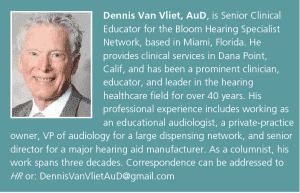Final Word | June 2018 Hearing Review
In April of this year, I accepted a position to work in a clinical capacity in Orange County, Calif. It is in the city of Dana Point, and there are ocean and harbor views nearby. It’s a small, close-knit community, with many of the patients coming in on a personal referral basis. After working for a manufacturer for 10 years, with only limited opportunity to work with patients, this is a welcome change to get “back in the saddle” and enjoy nearly full-time patient care. I will also have some educational and professional relations’ responsibilities in my role.
An additional benefit of this new role is that I will acquire many more stories to tell in these “Final Word” columns. David Kirkwood, my editor when I was writing for the The Hearing Journal, once asked me if my stories were true or somewhat fictionalized to make a point. I replied that in this profession there are many things that happen that one couldn’t possibly make up! I need to keep them anonymous for HIPAA and my personal respect for patients, but the stories themselves are real.
This week, an 80-year-old grandmother came in holding a pair of receiver-in-the-canal (RIC) hearing aids she had on loan from a nearby big-box store. She indicated that the hearing aid dispenser at the store had told her she may do better in a professional office setting because of her specific needs and expectations. The patient complained that the hearing aids “absolutely don’t work!” I set down her chart and settled back to hear the full story. She noted that she had “no problem” in face-to-face conversations, but had difficulty hearing the sermon in church, trouble hearing her children and grandchildren who “don’t look at her when they speak,” and had trouble in groups and restaurants. We hear these very same predictable complaints every day, but I let her run through it all to understand what was most important to her.
I asked her what situations she had experienced that led her to come to the conclusion that the hearing aids didn’t work. She explained that in order to “properly test” the hearing aids, she sat in the very back row of the church and tried to listen to the sermon. Puzzled, I asked if that was where there was a hearing loop or if some other assistive equipment was located in the back. She replied that she simply wanted to put the hearing aids to a good test. In other situations, she would pull the hearing aids out of her purse and turn them on, and she complained that things were louder but not clearer. The fitting she had was an open fit, and I asked about how much English was spoken in her home versus her native language.
She indicated that, with her children and grandchildren, it was exclusively English, but she frequently spoke her native language with her husband. I was concerned that she may be trying to communicate in a tonal language that may not benefit from an open fit. As we discussed it further, I ruled that out as a complication. Her hearing loss is a common symmetrical moderate sloping sensorineural loss, and she should benefit from additional audibility.
Listening to her story gave me a good sense of her expectations and perspectives. I began counseling her with the statement that no matter what is done, based upon her expectations, regardless of what hearing aids she wears, she will likely be disappointed in the outcome. What she would like, and indeed what we would like to provide her with, is clear undistorted speech in the environments that she described. I followed up with the fact that she absolutely needs better audibility and that it is quite possible for us to provide that. I redirected her focus on hearing clearly to make the point that her ultimate goal is to easily communicate with her family and others. I explained that hearing aids alone will not achieve that.
The Final Word? I recognized early on in our conversation that this woman may very well choose not to have me as her provider. I felt it was more important for me to try and set her focus and expectations in a direction that would allow her to be open to a treatment plan that may include hearing aids, as well as different communication strategies that will be necessary for her to have a better quality of life.
Most importantly, I hope that she walked out with an understanding that the process of better hearing is not about the device, but about her efforts and our services and professional skills. She understands that it will cost more than the quoted price at the big-box store. It will be up to her to decide if that is a good value. I also hope that she learned it is a terrible idea to test hearing aid function (without streaming or hearing loop) from the back pew in church.
Citation for this article: Van Vliet D. Better hearing and realistic expectations. Hearing Review. 2018;25(6):50.
Image: © Lisa F. Young | Dreamstime.com







Hearing rehabilitation is mostly psychology, and programming techniques to better the responses at the brain. It also involves daily exercises with exposure to sounds that help trigger appropriate responses. My patients do very well with my methods, and allow sounds to become a daily part of their lives without negative impacts.I am presenting my techniques at the HEAl 2018 Conference in Italy next,week, as also help identify middle ear pathologies that no one seems to treat when fitting hearing aids. Most aging patients have such pathologies. Understanding them is the key to successful hearing aid fittings.
I have hearing difficulty similar to the woman you describe and as I read your comment I eagerly anticipated your “solution” or at least your recommendation. You led up to it but then ended without saying something. What services and skills do you refer to when you say: “the process of better hearing is … about … our services and professional skills. She understands that it will cost more than the quoted price at the big-box store.”? What will help her that costs more?
Robert, such services cannot be pinpointed or forecasted. These steps may entail an additional cost, for the time spent in counseling and follow up visits. None of these services are ever provided at Costco !
regards,
Jay Muhury.
Jays Hearing in Long Beach, CA
I would respectfully amend this to say a consumer is unlikely to receive the same level of counseling, personalized services, and follow-up care at Costco in comparison to some other traditional hearing aid dispensing outlets. However, most dispensing professionals at Costco are good at what they do and provide hearing aid adjustments, etc, when needed. While some may disagree with me, I like the fact that the dispensing professional at Costco recognized the situation and recommended the patient seek appropriate hearing help where she could get more individualized care.